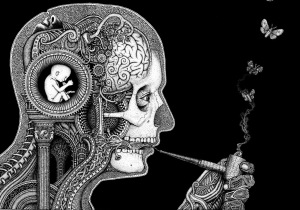Philosophy has come under attack a bit on this blog. Martin is worried about the unnecessary termino-logical contortions philosophers seem to love putting themselves through in making simple points, and Frank Weyns has argued that philosophy constitutes a wild-goose chase for absolute truth. (THIS MAY BE A LITTLE UNFAIR. FRANK WEYNS’ POSITION ON THIS WAS MORE NUANCED THAN I GOT ON FIRST READING…PERHAPS CLOSER TO THE ONE I OUTLINE HERE THAN I NOTICED. (edit)) He has also claimed, in a response to a post of Katy’s, that feminist philosophy is impossible.
In this post I shan’t argue against either of these claims about the nature of philosophy (directly). Rather I’ll put forward a different view, my own, which is contrary to those mentioned above. The reader can decide for themselves.
Is philosophy the search for absolute truth? Maybe. Is there any such thing? Maybe. Either answer to the latter question (yes or no) is to my mind hubristic – rather as any definite answer to the question of whether or not there is a God. The only respectable position on such matters is either agnosticism or a self-professed confession of faith.
While I think philosophy might be a search for absolute truth, and that that search may or may not be futile, it is not the reason I love philosophy.* Nor is it the reason I think philosophy should (and I think it should!) be pursued.
I think of philosophy as a discipline whose principal aim is the challenging of any and all preconceptions simply in order to open up new avenues of thought and enquiry. Forget about absolute truth: Descartes argued that there were two completely inseparable realms, the mental and the physical, of which the mental is in some sense prior; Kant that the mind has an essential role in the constitution of the physical world; Berkely that there may be no physical world whatever. These assertions may (for all we know) be true or false – scientists have yet to disprove esse ist percipi. What is interesting (for me) is not whether they are really true or false, but the ideas themselves – seeing how these ideas fit into a world view, how attractive or inattractive that world view might be, how they challenge basic preconceptions that people (now and/or then) have taken to be obvious. Such enquiry first reveals limits to what we can know about the world, and then fills in the gaps exposed by those limits with arguments that should, I think, be judged not by whether or not they take us closer to absolute truth (whatever that may or may not be), but rather by a) their deductive rigor (they must, pace Martin, be at least logically consistent)and b) aesthetic constraints like elegance, simplicity, conformity to common sense, and so on.
This sort of radical challenging of basic preconceptions** is in fact common to the very best human achievements in science, philosophy, art, music, literature, and mathematics (to name a few). Whether or not we call certain people working these fields “philosophers” comes down to a terminological quibble; and of course not all mathematicians, scientists or what have you are philosophers even in this sense. But some (by my definition here) certainly are. I think there is a plain difference between those mathematicians who, for instance, use antecendently established algorithms to code up secrets and those mathematicians who behave more like philosophers, who challenge basic mathematical preconceptions (does -1 have a root? Are there infinite numbers?). Like stories could be told for other disciplines (think of the humdrum scientist working on hair-care products as opposed the theoretical physicist who suggests there may be things neither wave nor particle), and in each case folks of the latter “philosophical” kind tend to be the truly great ones (e.g Kurt Goedel in maths, Wittgenstein in philosophy, Albert Einstein/Werner Heisenberg*** in physics, James Joyce in literature, Arnold Schoenberg in music, Malevich in art to name some contemporaries).
To my mind this view of philosophy makes it plain that feminist philosophy is possible and distinct from political feminism. Political feminism is concerned with actively furthering progress in terms of women’s rights and so forth; but a feminist philosophy involves challenging preconceptions people might have in various areas of thought – either in terms of ideas about the feminine, or ideas that do not include the feminine explicitly but perhaps should do. As an example of this sort of preconception, Frank Weyns wrote in a comment in support of his views about the impossibility of philosophical feminism:
Philosophy admirably concerns itself with human nature in general, i.e. it tries (or should try) to understand what is common across that broad spectrum we call the human race, i.e. it should continue to try hard to abstract from human specifics that relate to how individual political segments of society aspire to politically differentiate themselves from the human race in general..
Why this preconception of human nature as ungendered? One might think that part of what it is to be human is to be gendered, and thus that an exploration of human nature will involve understanding the essence of each gender and their relations; or one might think that the homogenized ungendered view of human nature is correct, but that (since most “great thinkers” of history have been white european males) the current ungendered view is in fact unnecessarily biased towards men. I think these avenues of overtly feminist philosophy can and should be explored****; for philosophy just is (on this view) precisely the exploration of such avenues, for no reason other than that they are there. Doing so is (to my mind) of great intrinsic value, and the reason I ❤ philosophy.*
*For etymologists: note the meta-love here 🙂
** of course the same constraints do not apply; but certainly great musicians, artists and so on challenge ones preconceptions in those areas.
***http://www.naturalthinker.net/trl/texts/Heisenberg,Werner/Heisenberg,%20Werner%20-%20Physics%20and%20philosophy.pdf
**** checkout SEP on feminist philosophy – metaphysics, epistemology & so on.


